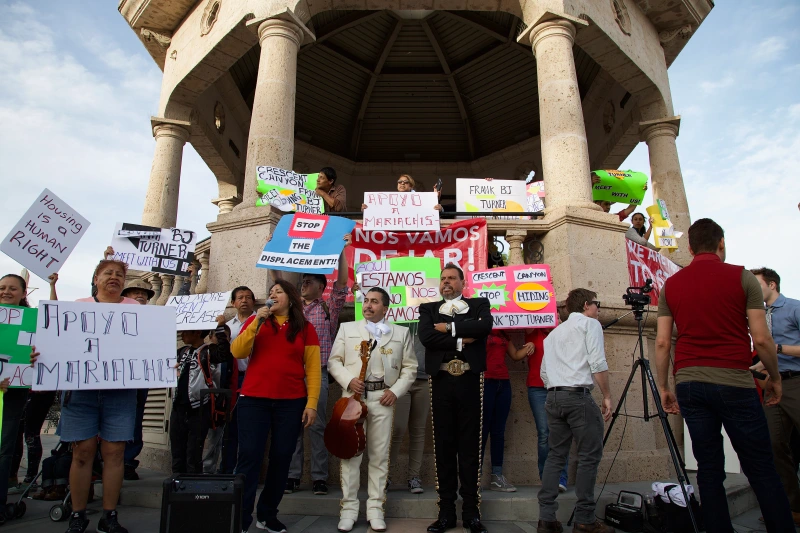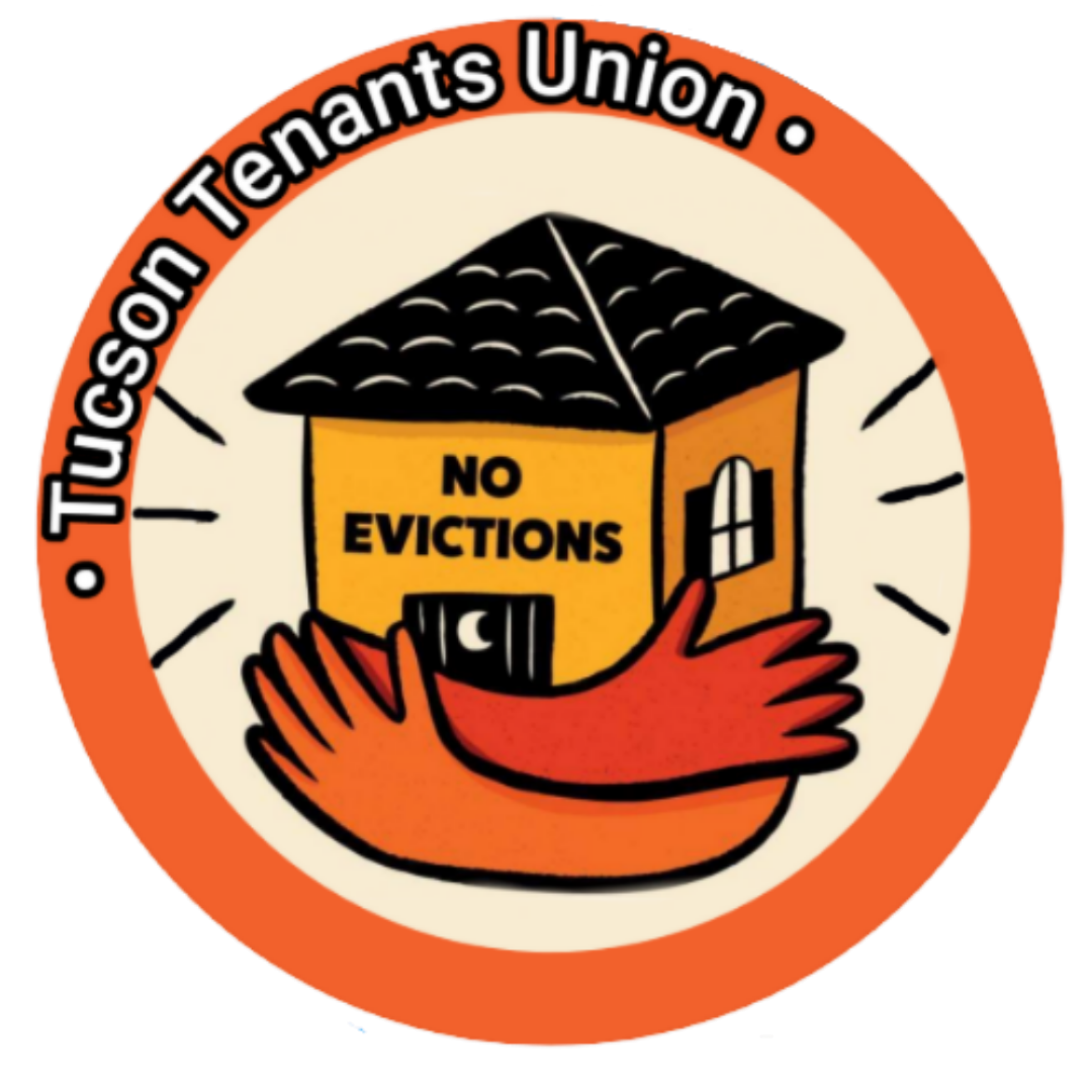Building Tenant Power is essential for creating and maintaining affordable housing.

Mariachi musician Luis Valdivia (white suit, center) waits to address the crowd regarding an $800 rent increase he was hit with at a rally at Mariachi Plaza in April, 2017. He stands next to Arturo Ramírez, president of the Organización de Mariachis Unidos de Los Ángeles. Photo and Text Credit: Sahra Sulaiman/Streetsblog L.A.

For tenants in Tucson and Southern Arizona, join the Tucson Tenants Union to build collective power, learn and share information about tenants rights, and support efforts to stop evictions and rent hikes. Upcoming Tucson Tenants Union Meeting Information available here.
Together we are strong! Join the efforts of local housing justice organizing:
Tucson Alliance for Housing Justice: Sign up for mailing list here to stay in the loop of upcoming meetings and campaigns.
Casa Maria Catholic Worker is a soup kitchen and organizing community leading tbe fight for housing affordability in South Tucson. Come serve a meal, learn about efforts, or show up at a demonstration.

As a landlord, you are in a uniquely influential position in regards to being able to help ease the current shortage of affordable housing. Every property owner is in a different financial situation and we know that not everyone is in a position to consider some of these suggested practices. That said, given the extreme need for affordable housing options in our community, we encourage you to consider whether you could:
Why might you do this? Average and median rents in Tucson have increased 33-36% over just the last two years. And the average rent for studios and 1 bedroom units have increased the most relative to other rental units.


Rent prices usually do not reflect the actual costs of maintaining a property. We encourage property owners to look at the actual costs of maintaining a property and to consider charging closer to the actual costs of your time and resources spent on the property. A reassessment of your actual costs may help you determine the extent to which you could keep rents stable over time, or even lower them to help counter the current rise in rents. Many people with lower or fixed income (e.g. people with disabilities and seniors) simply cannot afford these recent rent increases. And since these increases are happening in the context of a lack of affordable housing options, the risk of housing insecurity or homelessness for these people increases dramatically. Simply put, if you are profiting from your properties and are financially comfortable, how much profit could you comfortably forgo to invest instead in the health and wellbeing of our less financially secure community members? And last, we understand that you might not see this as “your job” to do this. However, in the absence of sufficiently effective solutions from government or major private sector actors (e.g. developers and larger commercial property owners) to address the crisis that we are in right now, we are making this appeal to individual members of our community to consider doing what they can.
There is a severe lack of housing eligible for Housing Choice Vouchers (formerly Section 8), so even after people wait years to get off of the waitlist and receive their vouchers, many are unable to find eligible housing.
Complying with the requirements of the Housing Choice Voucher program and renting to a tenant with a Housing Choice Voucher is a tangible way to support families with Housing Choice Vouchers.
-Thinking of Becoming a Housing Choice Voucher (fmr. Section 8) Landlord?
https://www.tucsonaz.gov/hcd/HCV_landlord
-Resources for Housing Choice Voucher landlords
It is illegal to discriminate based on race and other protected categories. Here are some legal ways that you can incorporate racial justice and anti-discrimination into your renting practices
A primary barrier to the effective functioning of our existing homelessness programs intended to either prevent entry into homelessness or to support individuals and families exiting homelessness is the lack of available affordable housing units. As a property owner you may be able to directly assist with this issue. Organizations like HOM Inc. provide services and support to landlords interested in providing housing intended to reduce experiences of homelessness.
Learn more here about the different types of programs and supports that are available for landlords interested in this option. Depending on what type of housing you are providing (e.g. rapid re-housing or permanent supportive housing) to different types of tenants with various needs there are supports and incentives tailored to your situation.

Stigma surrounding people experiencing homelessness is a major barrier to their ability to secure housing. We ask you to consider the fact that as more and more households are displaced by rising rents, there is an increasing share of individuals and families who have never experienced homelessness who are experiencing homelessness for the first time. Being able to get such a household into housing quickly will reduce the negative impacts of this experience for these household members.
In many cases, these household members do not have major barriers to living independently and do not require support for physical or mental illness or a substance use disorder. Individuals exiting longer experiences of homelessness often require support managing their mental health or substance use and many are not able to live in a fully independent manner. In engaging with an organization like HOM Inc., their role is to assist in the management of any specific challenges that might arise from working with people with such histories. If it makes sense for you and your household we encourage you to consider being involved with such support. Homelessness is on the rise locally, and an extremely concrete and direct way to reduce homelessness is to provide housing opportunities for community members who are trying to avoid or exit homelessness.
Having roommates and living with family is one of the most common ways people afford housing. It is very common for people to advertise rooms for rent on sites like Craiglist, Roomies.com, Roommates.com, or through informal networks such as Signal chats where people share housing information and look for roommates.
In Tucson, a few groups are specifically supporting Seniors to connect with homesharing opportunities. Tucson Home Sharing provides education, outreach and advocacy toward creating and sustaining home sharing partnerships while supporting all other beneficial planning outcomes for healthy aging. Many of the people who connect with Tucson Home Sharing are seeking homesharing as an option to support aging in place, and can involve rent exchange, help around the house, or a combination of the two.
Pima Council on Aging is also beginning a HomeMatch program for seniors over 60 to help seniors connect with homesharing opportunities.
Silvernest is a for profit service that offers homesharing options and matching with potential roommates: https://www.silvernest.com/
Often called casitas or “mother-in-law” units, an Accessory Dwelling Unit (ADU) is an independent housing unit with its own kitchen, bathroom, living and sleeping space. These units are typically under 1,000-square-feet and are accessory to a primary residence. ADUs can be detached, attached or interior to the primary residence.
The Pima County Community Land Trust and Cuadro Design are partnering on the "Mi Casita" Project to help make ADUs accessible for people with low incomes.
-Information on ADUs and regulations from the City of Tucson
https://www.tucsonaz.gov/pdsd/accessory-dwelling-units-code-amendment
An ADU does not need to be built from scratch, but can be created through the conversion of a garage, basement, or attic.
-If you are interested in building an ADU, architects at Cuadro Design are working to make economically accessible designs.
Consider offering for tenants to rent-to-own or implement other policies where they are building equity.
Stay tuned for legal resources and sample lease agreements we are creating. Please contact us if you have materials we can use!
When it comes time for you to sell a home, consider selling it off market directly to an existing Tucson resident who may not be able to compete in a bidding process. Consider prioritizing people who face barriers to accessing homeownership and even potentially carrying part of the loan at low or no interest. Contact us on the form below if you would like to discuss options that might be right for you. Also consider enrolling in an Allyship and Housing Justice course to work through options alongside a cohort.
Send us a message or join our mailing list by entering your information here. We will get back to you as soon as possible. If you have received an eviction notice and need immediate assistance, please contact Pima County EELS at 520-724-3357.
Envíenos un mensaje o únase a nuestra lista de correo ingresando su información aquí. Nos comunicaremos con usted lo antes posible. Si recibió un aviso de desalojo y necesita asistencia inmediata, comuníquese con Pima County EELS al 520-724-3357.
Website creation supported with funding from the City of Tucson Housing and Community Development Department and Tucson Pima Collaboration to End Homelessness.